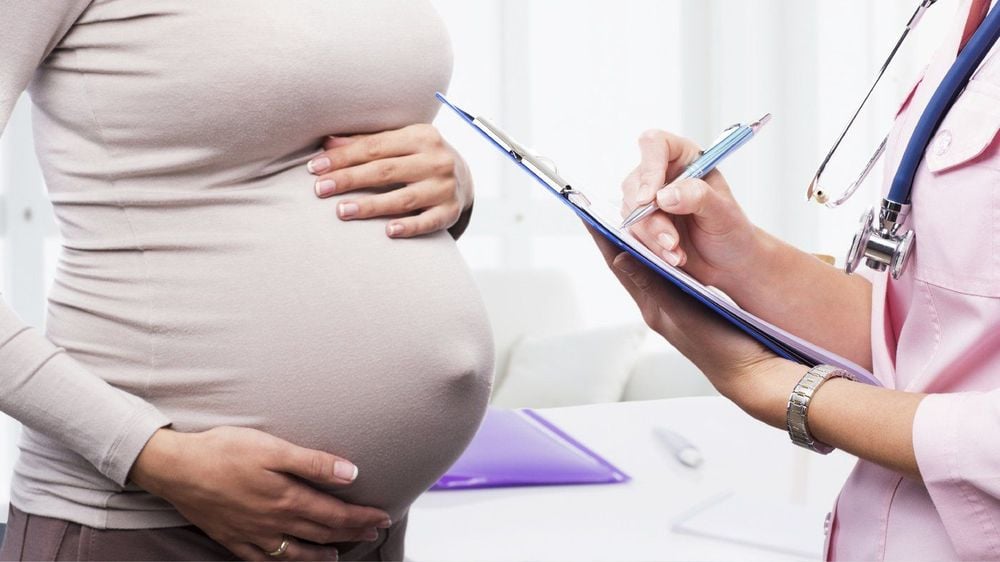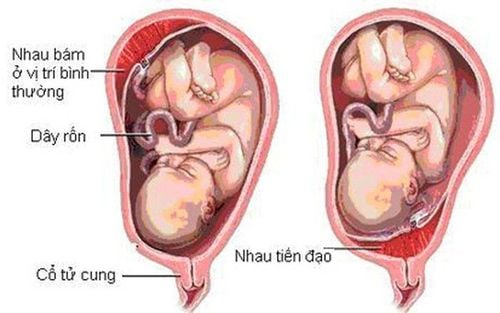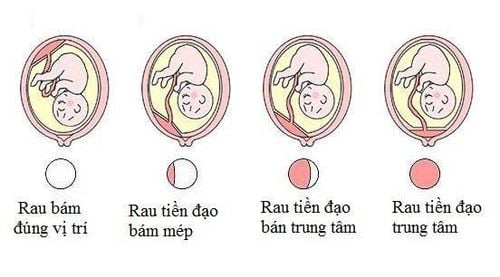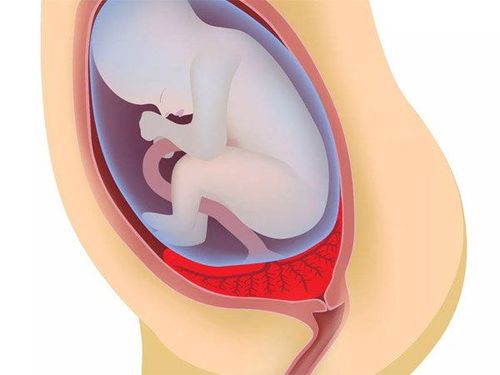This is an automatically translated article.
The article is professionally consulted by Specialist Doctor II Tran Thi Mai Huong - Department of Obstetrics and Gynecology - Vinmec Hai Phong International General Hospital.
The last three months of pregnancy is an important period for both mother and baby, if a woman has sudden abdominal pain with bleeding, it may be a symptom of placental abruption. This is a disease that can lead to dangerous complications for mother and baby.
1. What is a veggie?
The placenta is the organ that connects the developing spores to the wall of the uterus, providing nutrients, eliminating waste, and exchanging gases through the blood with the mother.Placental abruption is a symptom of immature placenta that separates partially or completely from the uterine wall, disrupting the supply of nutrients to the fetus. After the placenta is completely separated from the uterine wall, the fetus must be taken out immediately because there is no more blood flow to nourish the fetus.
Complications of placental abruption are very dangerous for mothers and babies, with up to 15% of fetal deaths from this disease.
2. Causes of placental abruption disease
The direct cause of placental abruption is damage to the blood vessels of the uterine lining where the placenta attaches. In which the factors that lead to damaged blood vessels include:Direct trauma in the maternity abdomen such as traffic accidents, daily-life accidents or falling during work. Because the needle punctured the amniotic fluid in the wrong place, causing hematoma behind the placenta causing placental abruption Blood vessels were damaged by diseases of placenta previa, pre-eclampsia, high blood pressure, diabetes... Because the doctor's method of pregnancy rotation is not correct, pulling the umbilical cord can also cause placental abruption.
3. Is the vegetative state dangerous?
Placental abruption is especially dangerous, especially for women in the third trimester of pregnancy.If not treated promptly, the fetus will be deprived of nutrients and oxygen, causing danger to both mother and baby. Complications of placental abruption occur very quickly, need to be treated immediately otherwise it will lead to miscarriage or premature birth.
Complications of the disease include:
Hemorrhagic shock: A state of heavy blood loss, occurring very quickly after the pregnancy and placenta come out, causing the mother to fall into a critical condition. Coagulation disorders : Continued bleeding due to lack of clotting factors Anuria : Anuria is caused by heavy bleeding causing shock and hypotension. Acute liver and kidney failure, adrenal insufficiency, high blood pressure... In severe cases of placental abruption, if not treated promptly, the fetal mortality rate is 100%. Pregnant women are also at risk of late death from complications of placental abruption.

4. How to recognize placental abruption?
In order to limit the dangerous complications of placental abruption, pregnant women need to listen carefully to their body and watch for some of the following signs:4.1 Functional symptoms Pregnant women appear to have sudden pain, seizures. persistent and prolonged pain. The pain starts from the uterus and spreads throughout the abdomen, the abdomen is tight... Pregnant women have thin bleeding, no clots.
4.2 Systemic symptoms Pregnant women have symptoms of dizziness, shortness of breath, cold limbs, pale skin, blood pressure increases and then decreases slightly.
4.3 Physical symptoms 70% of cases of placental abruption have symptoms of preeclampsia, uterine contractions that are persistent and irregular, difficulty palpating fetal parts through the abdominal wall, rapid fetal heart rate changes or not heard in severe cases of placental abruption, the cervix is dilated thin and hard, amniotic fluid is pink.
4.4 Definitive diagnosis based on the type of disease Latent form: not detectable clinically before delivery, can be detected by prenatal ultrasound. Mild form: The mother is in a normal state, vaginal bleeding is little or no, fetal heart rate is normal, ultrasound can see a hematoma behind the placenta. Moderate form: Vaginal bleeding, rapid pulse, possible hypotension, abnormal uterine contractions, fetal distress. Severe form: There is a lot of vaginal bleeding, strong uterine contractions and continuous pain, no fetal heartbeat, severe blood clotting disorder.
5. How to prevent abruption disease

Especially in the last three months of pregnancy, health monitoring is even more important. When there are signs such as vaginal bleeding, abdominal pain.. the pregnant woman must go to the hospital for examination immediately.
Vinmec International General Hospital is currently implementing Maternity Care Packages, performed by a team of leading doctors and nurses with both expertise and experience in maternity, with the support of a machine system. Modern technology helps to monitor and diagnose problems during pregnancy, especially stillbirth, to achieve high efficiency and accuracy.
Doctor Tran Thi Mai Huong has 25 years of experience in examination and treatment in the field of Obstetrics and Gynecology, lower tract surgery, laparoscopic surgery. Has held the position of deputy head of the School of Obstetrics and Gynecology, deputy head of the delivery department - Hai Phong Obstetrics and Gynecology Hospital.
Any questions that need to be answered by a specialist doctor as well as customers who have a need for examination and treatment at Vinmec International General Hospital, If there is a need for consultation and examination at the Hospitals of the medical system nationwide, please book an appointment on the website for the best service.
Please dial HOTLINE for more information or register for an appointment HERE. Download MyVinmec app to make appointments faster and to manage your bookings easily.














